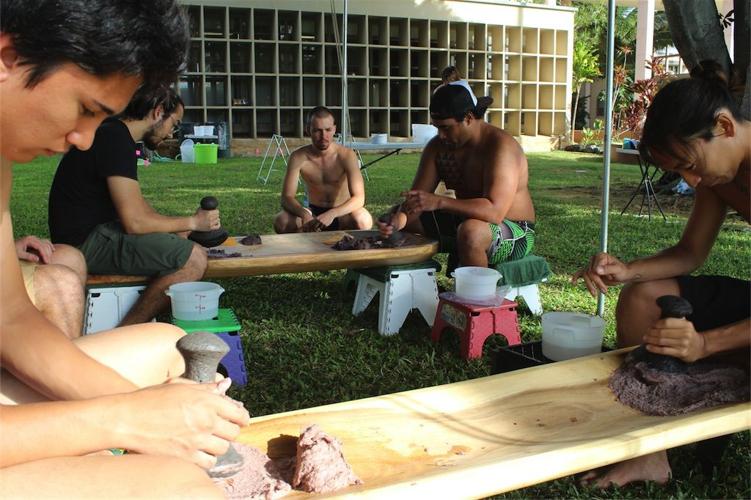Pipe Lines of Kaimu: Much Ado About Poi
Become a
Premium Member
and post notes and photos about your poem like Hilo Poet.
Poetic Form: Narrative
Inspired: 2023 December 01
Image: Hawaiian Youth Traditions by Admin for Families & Children


Welcome to a typical 'Luau' spread. The first thing that is best to learn is the Hawaiian word, 'ono', which means, delicious. It's a word bandied about before and after food goes in your mouth. In later years, it became a slang word as 'onolicious.' The main dish at any luau is Poi (PO-ee) pronounced like boy but with a, p sound poy/poi. Either variety of two, the most popular is the taro poi, which is a root vegetable that grows underground in a Lo'i (LOW-'ee) taro patch.
There are two types of Lo'i, the lowland Lo'i are mostly water-locked, but some are not and usually are uphill Lo'i. The water-locked Lo'i taro is water-logged which makes the taro dense and heavier. The dry Lo'i taro is watered every so often and partially grows above the dirt line open to direct sunlight. These dry taro are bigger in size but lighter in weight. When they are harvested, the greater part of the taro root is severed/chopped off, and the smaller part which is mainly the top half of the root is the base of the stem where the taro leaf grows. The exposed stalk of the leaves will also be cut off. This will leave a small part of the taro root with just the stem of the stalk still attached. The root end will be replanted back into the dirt, and the stalk of the severed leaves will be left above ground while the chopped taro root end is covered underground.
Ulu (UU-lou) or breadfruit is the tree-grown' poi variety left to nature with little to no human intervention, except when harvesting them becomes necessary. The choice becomes the determining factor for when ulu is to be picked. Paiai (pa-EYE-yai) or poi pounding is the processing method of conversion from their hardened forms to a soft, palatable form that we call poi. The taro and ulu are placed in separate big pots atop prepared firewood. Water is poured into them, and then the wood is fired up. When they are softened, their fibrous skin is peeled away. In my younger days, we had used these large opihi shells, but a handy knife or regular potato peeler would suffice.
Now they're prepped for the poi pounders which are originally made from igneous lava rocks that are shaped into a long slender neck-like forming the handle of the poi pounder and its very top will jut out a bit so the handler will have better control of its use. The lower part will jut out more and be thicker in size with a well-rounded base. The poi pounders board are usually made from a Koa tree trunk to which it will be cut into a board at varied lengths, mostly three to four foot long, and its larger middle section will be carved down and out. Then the board will be paper sandied and treated to a Koa shine.
Pounders will sit on either longer ends of the board. Water will be hand tossed onto the board, the starter peeled taro will be slightly flatten and act like the catcher. The subsequent taro's will sit on the catcher while ever so often, the pounder's rhythmic moves of grabbing water for the lava rock pounder base with a quick wet-wash while it drops onto the flatten taro as it builds up. Loose hand grabs water from nearby bucket, wet-wash pounder bottom that loosen up the taro buildup as well as cleaning off taro that may stick to its base, while the other hand remains on the pounder handle. Sometimes the pounder wiggles the round base so to breakup unyielding clumps. The loose hand will also gather up the smoothening taro and do a folding move with the loose hand and pound with the other, repeatedly, until a smooth consistency appears, after which the poi is poured into large crock containers.
Older Hawaiians prefer days old poi that turns, like fine wine, the fermentation has a preferable taste, over fresher poi.
Copyright © Hilo Poet | Year Posted 2023
Post Comments
Poetrysoup is an environment of encouragement and growth so only provide specific positive comments that indicate what you appreciate about the poem. Negative comments will result your account being banned.
Please
Login
to post a comment